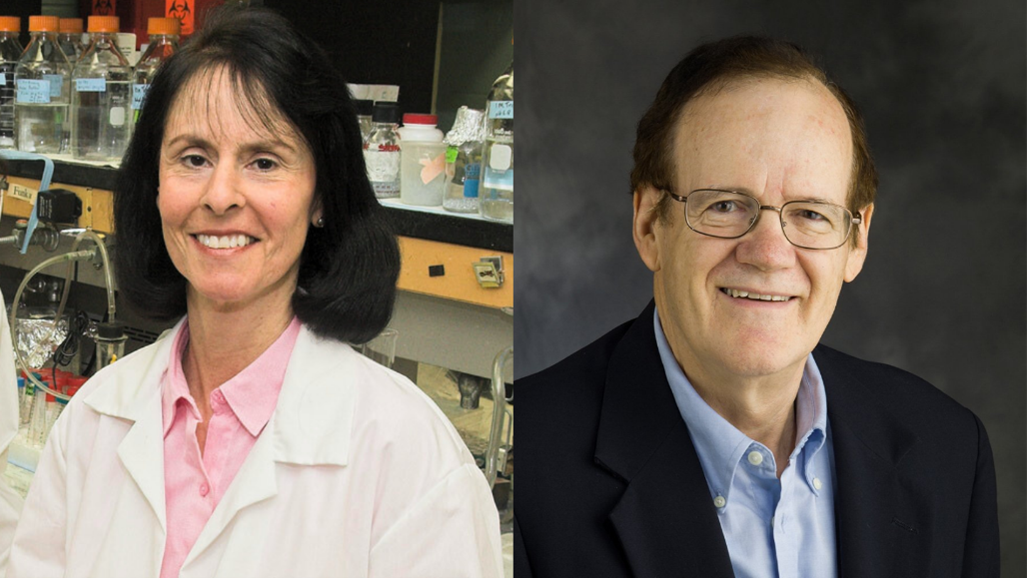Cancer Center at Illinois researchers Benita Katzenellenbogen and John Katzenellenbogen.
Cancer Center at Illinois (CCIL) researchers Benita Katzenellenbogen, Swanlund Professor of Molecular & Integrative Physiology, and John Katzenellenbogen, Swanlund Professor of Chemistry, have developed a new compound with efficacy in suppressing tumor initiation, progression, and metastasis of several types of breast cancer.
In research published in The Journal of Clinical Investigation and in Breast Cancer Research and Treatment, Benita and John describe a new inhibitory compound that blocks the Forkhead box protein M1 (FOXM1), a protein that plays a critical role in tumor cell growth and metastasis.
“Luminal B breast cancer is an aggressive type of breast cancer for which improved targeted therapies are needed, so it is very encouraging that our FOXM1 inhibitors worked so successfully in a luminal B breast cancer preclinical model,” said Benita.
Because cancer patients often use a combination of several cancer treatments, it is noteworthy that the FOXM1 inhibitors work synergistically with current cancer medications, such as proteasome inhibitors and CDK4/6 inhibitors (palbociclib, abemaciclib, and ribociclib), to block cancer proliferation using lower doses of each compound effectively. These lowered doses may reduce off-target side effects from cancer drugs.
The findings suggest that additional translational and clinical studies are warranted. “Further studies could advance these FOXM1 inhibitors toward clinical implementation to hopefully improve outcomes for patients with breast cancer,” John said.
Since the FOXM1 protein is overexpressed in many other aggressive cancers, Benita and John are also collaborating with several cancer scientists to explore the efficacy of the inhibitory compound in other cancers, including ovarian and multiple myeloma.
This research was made possible by the extensive team of research students and scientists in the labs of Benita and John and the collaboration of researchers from McGill University and the Rosalind and Morris Goodman Cancer Institute in Montreal.
Editor’s notes:
- To contact Benita Katzenellenbogen, email katzenel@illinois.edu
- To contact John Katzenellenbogen, email jkatzene@illinois.edu
The two papers can be accessed online. “Coordinated activation of c-Src and FOXM1 drives tumor cell proliferation and breast cancer progression.” The Journal of Clinical Investigation. DOI: 10.1172/JCI162324. “Effective combination treatments for breast cancer inhibition by FOXM1 inhibitors with other targeted cancer drugs.” Breast Cancer Research and Treatment. DOI: 10.1007/s10549-023-06878-3.
The research reported here was funded by grants from the Breast Cancer Research Foundation (BCRF-083 to BSK and BCRF-084 to JAK and BSK), the NIH/NCI (1R01 CA220284 to BSK and JAK), the Julius and Mary Landfield Cancer Research Fund (to BSK), and the NIH Training Program T32 GMO70421 Fellowship to VSG, as well as the Canadian Institutes of Health Research (CIHR) Foundation Award FDN-148373 and Canada Research Chair in Molecular Oncology (W.J.M) (CRC – 950231033 X216779), CURE 30 Foundation Fellowship in Breast Cancer Research and George G. Harris Fellowship (I.N.), the US Department of Defense Congressionally Directed Medical Research Programs, and the Breast Cancer Research Program W81XWH-11-1-0046 (H.W.S).
Written by Jonathan King, CCIL Communications Team

